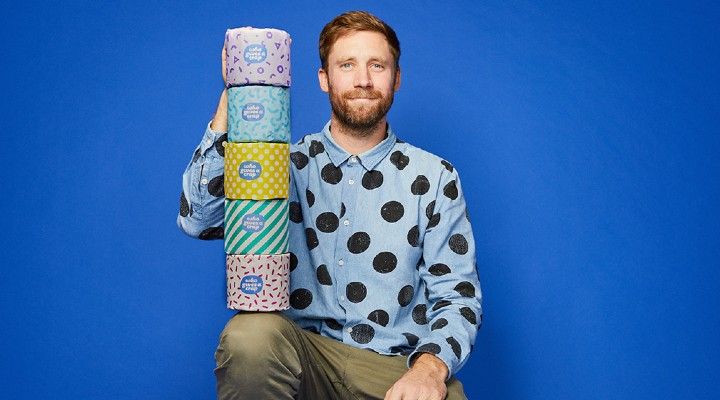Simon Griffiths is the CEO and co-founder of the profit-for-purpose business Who Gives a Crap, which donates 50 per cent of profits to global hygiene projects to ensure everyone in the world has access to a toilet and sanitation. Philanthropy has always been in Griffiths’s DNA. Before Who Gives a Crap, hospitality was the training ground for his business brain. Here, he shares how he came to be a part of the retail industry and the head of a toilet paper empire that ‘gives a crap�
crap’ about the environment and humanity. And he explains how he found himself responsible for making an error that “would be near-fatal for the company.”
Inside Retail: How did you get into the retail industry, and what are some of the different roles you’ve held along the way?
Simon Griffiths: My retail experience began when we started Who Gives A Crap, but I started a non-profit cafe, bar, and bandroom before Who Gives A Crap. In my opinion, hospitality is a great business training ground.
My role has always been CEO, but it has taken lots of different shapes and sizes over the years. To launch the brand, I sat on a toilet for 50 hours in a live crowdfunding campaign until we had raised enough for our first production run. All those hours, and a cold bottom later, we’d raised over $50,000 – it truly changed the course of our business, my role, and my life.
IR: What challenges have you faced in your career and how have you dealt with them?
SG: I firmly believe the minute you stop failing is the minute you stop learning. For me, the biggest failure I had was in our initial production run. I was responsible for production and did all of the quality control on the factory floor.
Production went really well, but when we started shipping the product to our customers we received a lot of complaints and subsequently discovered that I had made an error that would be near-fatal for the company – I had forgotten to check the quality of the perforations and we had produced 200,000 rolls of imperfectly perforated product.
The sheets literally had to be cut apart with a pair of scissors.
I sent an email to all of our customers apologising for the quality hiccup and promised to fix the perforations on our next production run. Fortunately, enough customers believed in what we were doing to repurchase and then went on to tell other people about Who Gives A Crap.
The big lesson I learnt in that moment was honesty really is the best policy.
Since then, we’ve always believed our customers and team will forgive us for our lumps and bumps, as long as we are open and honest about them.
We’ve had some global challenges in the last few years, which have been particularly testing from an operational perspective. For example, running a toilet paper company through Covid was pretty wild, and since then we have seen a lot of shifts and also noise in consumer sentiment.
The cost-of-living pressure that the UK is facing – earlier than anywhere else in the world.
We had to think about how we could adjust our messaging to focus on the value that we deliver to customers while educating them about price per sheet. We pivoted towards a really powerful message, essentially saying that our products were 30 per cent cheaper than the leading brands on a per-sheet basis.
This really resonated with British consumers, and as a result, the UK became our fastest-growing market over the last few years.
IR: What are some of your career highlights so far?
SG: Agreeing to sit on a toilet while on a live web feed to pre-sell the first $50,000 worth of our product was a pivotal moment in my career. We went viral and it helped us to build Who Gives A Crap into the business it is today.
I am also incredibly proud that we have raised more than $13 million in donations to date, to help give everyone in the world access to clean water and toilets. But, there is still a long way to go.
IR: What do you love about your job?
SG: What I love most about my job is that purpose is at the core of everything we do. Together, we are striving toward our goal of making sure everyone in the world has access to a toilet and clean water by 2050.
Having that shared common goal makes coming to work easy, fun, and very rewarding.

